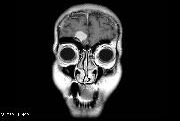Learning Objectives
- Focal epilepsy tends to have symptoms of signs of an aura
- Focal epilepsy may show signs of a focal onset on EEG and MRI testing
- Treatment of focal epilepsy is similar to that of other epilepsies, except that certain medications are preferred over others
History
A 43 year old man visits you in the office with symptoms concerning for recurrence of his epilepsy. He says that he has an odd feeling as if he has felt something before, but after several seconds, it is over. This has occurred about 2 dozen times in the past 3 months. His wife says he had a seizure in the middle of the night about one week ago. Since then, he has stopped driving. He had several generalized seizures as a teenager. These were effectively treated with valproate. After having no seizures for ten years, the medicine was discontinued, and he was free from seizures for about 14 years. He has no family history of seizures or head trauma.
At this time, he has no history of allergies to medications. He uses loratadine for seasonal allergies. He has a past medical history of a broken fibula which he obtained from an accident at age 31. He has a history of epilepsy as above.
Family history is pertinent for glioma in his maternal grandfather. He does not smoke and he has 3-4 drinks per week. Review of systems is negative after a fourteen system review was administered.
Examination
Temperature 98.8 F, pulse 68, blood pressure 132/81. He is mildly obese fellow, who appears his stated age. Cardiovascular examination is normal. He has normal intellect, recall, attention and language abilities. His visual fields and pupillary exams are normal. The cranial nerve function appears normal. Strength, tone and deep tendon reflexes are normal. His sensation is normal to light touch on both sides. He has normal finger-nose-finger movements. He has a normal casual gait and he is able to heel and toe walk.
This is a patient with a history of epilepsy, who has had a recent nocturnal seizure, who also describes a feeling of misplaced remembrance. To a neurologist, this may be a symptom of déjà vu. This is the French phrase for already seen. Similar symptoms may be jamais vu (never seen) or a sensation of an odd smell (burning tires, eggs, etc.). These symptoms suggest a partial seizure with origin in the mesial temporal cortex, an area of the brain rich in memory processing and smell recognition. Sometimes, these partial seizures are referred to as an aura, or warning sensation.
Mesial temporal epilepsy is a condition of partial, complex, or generalized seizures with focal origin in the mesial temporal cortex. As with other seizures, irritation of the cortex is often a cause of this condition. These seizures may be caused by stroke, neoplastic disease, developmental anomaly, or sometimes changes in the structure of the hippocampus. Detailed MRI study of a patient with this disorder may demonstrate a finding such as hippocampal sclerosis, a change in the hippocampus which predisposes a patient to this type of seizure.
There are other kinds of focal onset epilepsy syndromes, each with their own unique aura. Frontal lobe epilepsy usually has an aura of motor posturing or a vocalization. Occipital epilepsy often has a visual aura, usually on one side or the visual field, affecting both eyes.
In the case of mesial-temporal onset epilepsy, there may be certain EEG findings. The EEG may show an abnormality consistent with temporal slowing or sharp waves. Sometimes the abnormality does not localize properly to the side of the origin of the seizures. Since the mesial temporal cortex is on the underside of the brain, it is difficult to measure the brain wave activity of this area with scalp electrodes. At times, patients undergo invasive EEG monitoring in an operating room to better obtain information about the source of their seizure. This is often attempted when epilepsy surgery is considered.
Mesial temporal epilepsy may respond to medication treatment. Patient experience may vary with different medications and their side effects. Medications that are often prescribed for focal onset epilepsy are levetiracetam, lamotrigine, phenytoin, topiramate and carbamazepine. There are times when medications, even more than one medication, is not sufficient to control the symptoms. Anterior temporal lobectomy and similar surgeries are sometimes recommended for patients with refractory epilepsy of this type. The outcomes are fair, with some patients becoming seizure free without medication, and others finding it easier to control their seizures with medication after the procedure.
Review Questions
- The aura (warning symptom) that is typical for mesial-temporal lobe epilepsy is
a. Visual symptom, such as sparkling lights
b. A feeling affecting memory, such as déjà vu
c. A nonspecific vocalization
d. A sense of smell
e. Both B and D - In a case of mesial temporal lobe epilepsy, the EEG would be expected to show
a. Generalized 3 Hz spike and wave pattern
b. Electrocerebral silence
c. Temporal slowing or sharp waves
d. FIRDA (frontal intermittent rhythmic discharge activity)
e. All of the above - Conditions that may cause localization-related epilepsy, such as mesial temporal onset epilepsy, include
a. Stroke
b. A brain tumor
c. Cerebral abscess
d. Hippocampal sclerosis
e. All of the above
